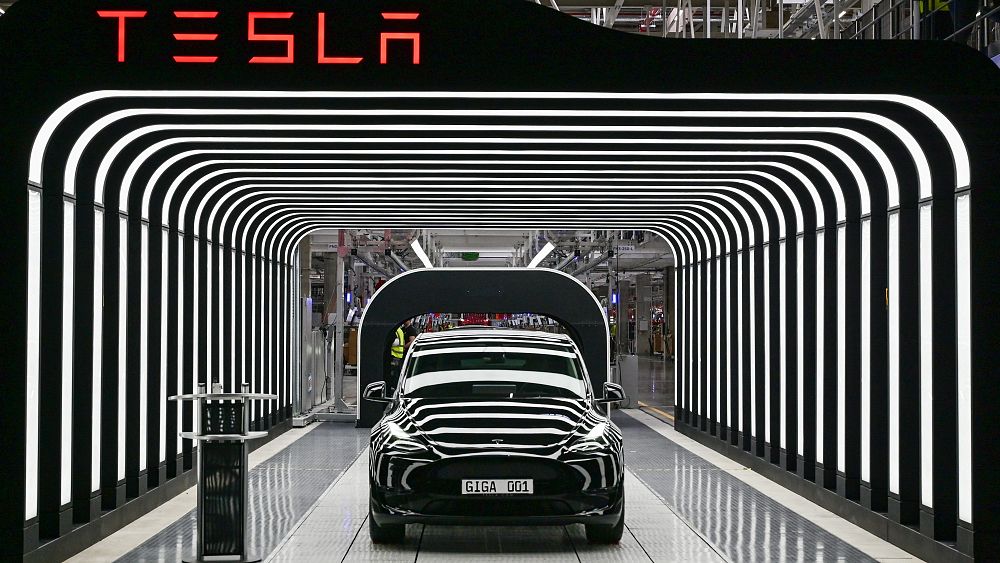
If Tesla’s plans are approved, the site will become Germany’s largest automotive plant, ahead of Volkswagen’s historic stronghold in Wolfsburg.
The factory, known as Gigafactory Berlin-Brandenburg, is situated approximately 30 kilometres southeast of Berlin.
In addition to doubling vehicle production from its current 500,000 vehicles a year, Tesla is seeking approval to expand its battery cell manufacturing capabilities at the same plant, raising the current battery storage capacity of 50 gigawatt-hours to 100-gigawatt hours per year.
If Tesla’s plans are approved, the site will become Germany’s largest automotive plant, according to the German business newspaper Handelsblatt, positioning itself ahead of Volkswagen’s historic stronghold in Wolfsburg, which boasts a production capacity of 800,000 vehicles a year.
Tesla’s rapid expansion in Grünheide, where the Gigafactory is located, has already significantly impacted the German automotive industry since it began production 16 months ago. Over the first half of 2023, Tesla surpassed Volkswagen in electric vehicle sales for the first time.
At present, however, the American electric vehicle manufacturer is still a long way from fully utilising its German plant, which opened in March 2022.
Currently, the plant only produces 5,000 units per week, resulting in an annual output of approximately 260,000 vehicles.
To seek public input on the expansion of the Gigafactory, the authorities of Brandenburg, the state where the Tesla factory is situated, have initiated a public consultation process online. Citizens have two months to comment on the project.
Early this year, the first phase of the plant’s construction was delayed due to the high number of objections from locals, who were primarily opposed to itswater consumption.
This time around, the company has implemented a more refined strategy. On Tuesday, Tesla workers actively interacted with local residents, focusing on a range of topics, including water use, biodiversity protection, and the environmental impact assessment related to the proposed expansion.
The US car company has long argued that the plant’s impact is relatively low and referred to the benefits of EVs in combating climate change. A spokesman also told AFP that Tesla was planning to “optimise” the process of recovering and purifying the water, so as not to increase the quantities of fresh water required.
Expansion of the Gigafactory is to be phased in gradually, with three partial permit applications planned.
“We have to ensure that the effects of the construction and operation of the plant are compatible with the environment,” a spokeswoman for the Brandenburg Ministry of the Environment told AFP.
A big push for German workers
According to Tesla, the Gigafactory currently employs more than 10,000 workers, and the company envisions that the workforce could potentially reach 22,500 employees in the near future.
“Join us at Gigafactory Berlin-Brandenburg to solve the next generation of engineering, manufacturing and operational challenges as we accelerate the world’s transition to sustainable energy,” Tesla’s website states, noting that they are “currently hiring across a wide variety of skill and experience levels—no automotive experience necessary”.
Will France be left aside?
French President Emmanuel Macron met Tesla CEO Elon Musk in May to discuss “the attractiveness of France and its industries”.
And in December last year, Macron and Musk also met in New Orleans during the French president’s visit to the United States.
They had, according to the latter, “a clear and sincere discussion” and exchanged on “future green industrial projects such as the production of electric vehicles and batteries”.
Macron has recently announced a series of measures to support innovative industries and transition towards greener technology. They include tax credits in fields like battery production, electric cars, hydrogen, and wind power, as well as accelerating authorisations for industrial projects.
“France is changing, is getting adapted to the course of the world, and I believe that we’re following the right path, which is to reindustrialise the country, to be more sovereign and more respectful of the climate and biodiversity,” Macron said on Friday during a visit to Dunkirk, in northern France.
However, whether France will successfully secure a Tesla factory in its territory remains uncertain.
